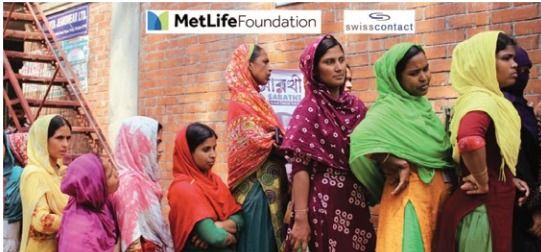![]() Mr.Ala Uddin Ahmad
Mr.Ala Uddin Ahmad
![]() August 27, 2023
August 27, 2023
![]() (0) Comment
(0) Comment

![]() Mr.Ala Uddin Ahmad
Mr.Ala Uddin Ahmad
![]() August 27, 2023
August 27, 2023
![]() (0) Comment
(0) Comment

Ready Made Garments (RMG) sector contributes around 80% of Bangladesh’s total export earnings making “Made in Bangladesh” a global tag. However, RMG workers who contribute towards the economic milestone (Bangladesh being one of the top three RMG exporters in the world) face a huge challenge in their lives.
In Bangladesh, approximately 80% of garment workers are women, the majority of whom receive their salaries in cash, have low levels of financial literacy, and lack access to formal banking services. The combination can make it difficult for workers to protect their income and save for the future. Since 2018, MetLife Foundation and Swisscontact have been partnering with a financial inclusion program that works with commercial banks and garment factories to bring workers into the formal banking system.
The program enables garment factory owners to pay their workers digitally, allowing workers to receive their pay more securely while reducing their transaction costs.
“Sarathi – Progress Through Financial Inclusion in Bangladesh”
Swisscontact is a leading organisation for the implementation of international development projects. It promotes integrative economic, social and ecological development in order to contribute to sustainable and wide-reaching prosperity in developing and emerging nations. In collaboration with local banks, Sarathi is also developing products that help workers receive their salaries straight in their bank accounts, save securely for their short- and long-term goals, gain access to credit products, and meet other financial needs.
Through this initiative, several partnerships have been established, including those with commercial banks who have opened banking outlets and installed ATM machines in and around garment factories so that workers can make transactions in a secure and convenient manner. With hands-on financial literacy sessions, Sarathi works to raise awareness of how banking services can help workers take control of their incomes and improve their financial health.
Sarathi has observed that wage digitization helps Ready-Made Garments (RMG) factories achieve improved efficiency through reduced transaction costs, higher productivity through faster transactions, and more transparent business management while promoting financial inclusion of RMG workers. Banking partners need a sustainable product model and platform to offer small scale savings accounts to these RMG workers.
Mission
Sarathi is helping to build safe and financially secured future for the RMG workers of Bangladesh who are contributing towards the economic growth of the nation. The success of Sarathi demonstrates that we need more long term sustainable financial inclusion initiatives rather than programs which are solely focused on charity. Sarathi has enabled four key components in building sustainable financial well-being for the RMG workers:
1. Day to day: Smooth short-term finances to meet financial obligations and consumption needs
2. Resilience: Capacity to absorb a financial shock
3. Goals: On track to meet financial goals
4. Agency: Capacity to make own decisions based on good information to evaluate services offered, seek advice as needed, and feel good about decisions made.
Sarathi increase the average monthly savings per worker by 318% from $11 (BDT 899) in 2018 to $37 (BDT 2,997) in 2019.
Sarathi in Numbers:
• 76,000 Salary accounts opened in 49 Sarathi partner factories
• 17,000 RMG workers reached through 226 financial literacy sessions
• 49 RMG factories disbursing salaries of RMG workers through bank accounts
• 4 large Commercial banks in payroll agreements with Sarathi partner factories
• USD 136M Wage mobilization
Sarathi has helped banks to develop appropriate savings and loan products, and bundle offers complementing the salary accounts of RMG workers. This collaboration model is enabling other financial market players like Mobile Finance Institutions (MFS) to explore the opportunity to get involved in wage digitalization.